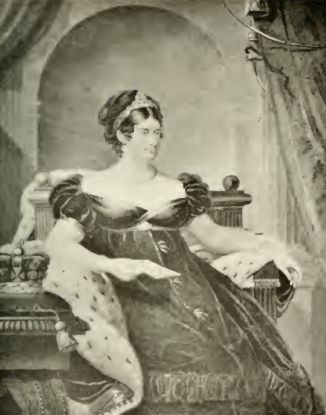nn
n
n On October 3rd 1820, Henry Brougham begannhis defence, in a display of oratory that instantly made him the most famousnpolitician in Britain. Some orators use persuasion to win over an audience,nothers favour absolute sincerity, whilst others yet opt for an almost innatensense of tact, or studied eloquence. Brougham’s talents lay elsewhere.
n
n
n
 |
| Queen Caroline |
n
n
n
nAt thenheart lay Brougham’s rock-solid belief in himself, in his unshakeable sense ofnself-worth, an adamantine self-confidence that surpassed mere egotism. He usednsarcasm, he used invective, but most of all he used a merciless, logical,nblood-chillingly precise, analysis of the facts. And now, with a great speechnexpected of him, Brougham set about delivering just that. He began by outliningnthe duties of an advocate, not as a definition but as a threat; that he wouldnexpose every fact of the case in defence of his client. If that meant exposingnevery sin, every fault and every foible of those accusing his client, then sonbe it. He was simply doing what was expected of the most inexperienced counsel.
n
n
n
| A Going – Caricature of Caroline as ‘a brazen statue’ |
n
n
n
nThe assembled Lords murmured, some in anger, some in apprehension, all in fullnawareness of the menace. The Queen, he admitted, had sought the company ofnforeigners, but whose fault was that? Why, the very same nobles assembled herento judge her now, those who had sought her company when she arrived in thisncountry, attended her court, sought preferment when it was hers to offer, thennabandoned her when there was a change, leaving instead for other places wherentheir ambitions might be satisfied.
n
n
n
| George IV |
n
n
n
nOf course she had consorted withnforeigners, when the English nobility had closed their doors to her. Hensketched lightly her situation abroad, how she had been excluded from her ownndaughter’s marriage, how news of that daughter’s death had reached her by accidentnand how that death had been immediately followed by the Milan Commission, withnits spies, its bribes and its intrigues.
n
n
n
| Mother Red Cap in opposition to the King’s Head |
n
n
n
nBrougham then turned his attention tonthe details of the witnesses, and with forensic precision, he pointed out theninconsistencies, the differences between what they had said to the MilannCommission and what the very same witnesses had said when they were examined byntheir Lordships. Times and dates did not match, one witness contradictednanother, details about what happened when varied, depending on whose testimonynyou believed. He poured contempt on the words of servants, poor menials offerednmoney to concoct whatever stories these English milords wanted to hear, broughtnover from Italy to live now in luxury and idleness. There was no conspiracynagainst the Queen, he said, but instead it was
n
n
n
n‘a grave and serious designnaccidentally formed.’n
n
n
n
n
| Caroline and Pergami |
n
n
n
nThe Milan Commission was dismissed as
n
n
n
n‘that greatnreceipt of perjury – that store house of false swearing and all iniquity,’n
n
n
nand parallels were drawn with another royal divorce case, that of Henry VIII,nwho had consulted Italian universities to verify the legality of his claim,nwhich had their unanimity in favour of the King rewarded with more thannadequate recompense.
n
n
n
| Villa d’Este |
n
n
n
nMajocchi’s conveniently unreliable memory was the nextnitem to be ridiculed by Brougham’s acid tongue, a man who said ‘Non minrecordo’ when asked if he had tried to regain his position after beingndismissed, but when asked at another time, ‘Did you apply to Count Schiavininto be taken back?’ had replied, ‘I did.’
n
n
n
| Theodore Majocchi |
n
n
n
nThis was a man who couldnrecall where every member of the Queen’s suite had slept in the Villa d’Este,nbut could not recall whether a new wing had been added to that building or not.nThe other witnesses were subjected to Brougham’s thunderbolts, their charactersndestroyed, their evidence torn to remnants, in an unrelenting tirade of scornnand derision. He summed up and concluded by urging the Lords to save thencountry, save the people, save themselves, but most of all to save the honournof the Queen of England.
n
n
n
n“I pray heaven for her! And here I pour forth mynfervent supplication at the throne of mercy, that mercies may descend on thenpeople of this country richer than its rulers have deserved; and that yournhearts may be turned to justice.”n
n
n
n
n
| Henry Brougham (in later life) |
n
n
n
nExhausted, he took his seat, and fornseveral minutes the House of Lords sat in stunned silence.
n
n
n
nTomorrow – The Defence defends itself